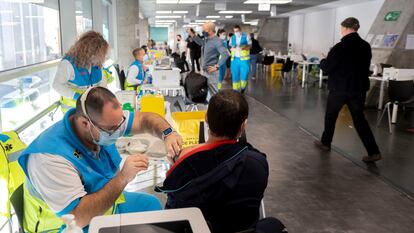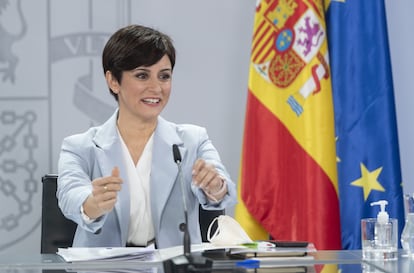Spain approves longer waiting period for booster shots after Covid-19 infection
The recommended interval is now five months, up from four weeks. The fast-spreading omicron strain has become dominant, accounting for up to 98% of cases

Spanish health authorities are changing the criteria for administering a booster shot of a Covid-19 vaccine to people who have recovered from a coronavirus infection. A five-month waiting period after diagnosis is now being recommended, instead of four weeks.
The decision comes shortly after the Health Ministry confirmed that omicron is now the dominant strain in Spain. The highly transmissible variant represented between 79.9% and 98.7% of all coronavirus infections for the week ending on January 16, according to samples sequenced in 14 regions, said the ministry.
Omicron has displaced the delta variant, which was the dominant strain in Spain until December. In the second week of January, delta only accounted for 1.2% to 9.3% of sequenced cases. The ministry’s report did not mention the possible presence in Spain of the omicron sub-variant BA.2, which has already been detected in several European countries.
On Monday the Health Ministry notified 305,432 new cases since Friday and added 253 deaths to the official tally. This brings the total number of known infections to more than nine million since the beginning of the pandemic in early 2020, while total fatalities number 91,994. The accumulated incidence over 14 days fell 37 points to 3,381 cases per 100,000 people, although experts note that real case numbers are likely much higher due to omicron’s rapid spread and the fact that many infections in people who self-test are going unreported.
Hospitalizations, considered a more accurate indicator, are on the rise. The ministry reported 19,617 Covid-19 patients in hospital, a rise of 942 from Friday. And 24% of intensive care beds are occupied by people with Covid-19.
Government spokesperson Isabel Rodríguez said on Tuesday that the sixth wave of the pandemic is “at a moment of flattening” despite the high case numbers, and asked citizens to “keep taking care of themselves so we may look at the virus in a different light in the coming months.”
Speaking after the weekly Cabinet meeting, Rodríguez skirted around the issue of whether the executive might soon lift the outdoor masking rule introduced at Christmas time. “Any decision will be made within the Inter-Territorial Council of Health and the Public Health Committee,” she said, alluding to advisory bodies made up of central and regional officials.
Rodríguez also noted that 90.7% of the over-12 population in Spain is now fully vaccinated while 53% of children between the ages of five and 11 have received at least one dose. The government official said that this high vaccination rate has managed to keep down hospitalization numbers despite the rapid spread of omicron.
New criteria for booster shots after infection

The Public Health Committee, which represents the Health Ministry as well as regional health officials, on Tuesday changed the criteria for receiving a booster shot that affects people who have recovered from a coronavirus infection.
From now on, this body recommends waiting five months after infection before giving a patient a third dose of a Covid-19 vaccine. Until now, this waiting period had been set at just four weeks, an interval that had been widely criticized by virologists and immunologists who felt it was too short and even alerted of the risk of causing “problems in the immune system.”
The Health Ministry said that available scientific evidence shows that a coronavirus infection in individuals with two vaccine doses triggers “a more potent immune response” to neutralize other variants.
“After vaccination, an omicron infection is like a new dose, but a more complete one, because we’re not just exposed to one part of the virus, as we are with the vaccine, but to all its antigens. Weeks later, the body has effective antibodies. Endlessly administering dose after dose without spacing them out in time will not provide us with better protection,” explained Marcos López Hoyos, president of the Spanish Immunology Society, in recent statements to EL PAÍS.
The flood of cases and the new guidelines mean that the administration of booster shots will be ongoing for a significant amount of time. Everyone 18 and over is eligible for one, and around 70% of over-40s have already received their third doses.
The Public Health Committee also agreed on new timelines for vaccinating children who have had Covid-19. Until now, a waiting period of four weeks had been recommended. Now, if a child gets infected before being vaccinated, he or she will receive a single dose eight weeks after the diagnosis. If the infection takes place after the first dose, the second shot will be administered two months after the diagnosis, as long as an eight-week period between the first and second doses can be observed.
Catalonia deescalates
The northeastern region of Catalonia plans to keep deescalating its coronavirus measures despite a rise in infections. Catalonia is now the region with the highest 14-day incidence rate in Spain with 5,402 cases per 100,000 people. Hospitals reported 2,838 Covid patients, up 22 from the day before.
After lifting the night curfew on Friday of last week, the regional government has agreed to eliminate other restrictions this coming Friday, such as the 10-person cap on social gatherings and reduced capacity at events and venues.
But night-time entertainment venues will remain shut for at least another week, said the Catalan government spokesperson, Patrícia Plaja, on Tuesday, alluding to the “fragile balance” inside the region’s hospitals.
The Catalan government will also allow business conventions to be held in person, a move that will benefit one of Barcelona’s biggest industry events of the year, the Mobile World Congress scheduled to open on February 28.
Regional officials also said they will analyze the need for the so-called Covid pass at restaurants and other venues. In the Valencia region, authorities said they want to extend the use of the pass beyond a January 31 deadline. Regional premier Ximo Puig said his executive will ask the courts for authorization to maintain the measure.
Tu suscripción se está usando en otro dispositivo
¿Quieres añadir otro usuario a tu suscripción?
Si continúas leyendo en este dispositivo, no se podrá leer en el otro.
FlechaTu suscripción se está usando en otro dispositivo y solo puedes acceder a EL PAÍS desde un dispositivo a la vez.
Si quieres compartir tu cuenta, cambia tu suscripción a la modalidad Premium, así podrás añadir otro usuario. Cada uno accederá con su propia cuenta de email, lo que os permitirá personalizar vuestra experiencia en EL PAÍS.
¿Tienes una suscripción de empresa? Accede aquí para contratar más cuentas.
En el caso de no saber quién está usando tu cuenta, te recomendamos cambiar tu contraseña aquí.
Si decides continuar compartiendo tu cuenta, este mensaje se mostrará en tu dispositivo y en el de la otra persona que está usando tu cuenta de forma indefinida, afectando a tu experiencia de lectura. Puedes consultar aquí los términos y condiciones de la suscripción digital.








































